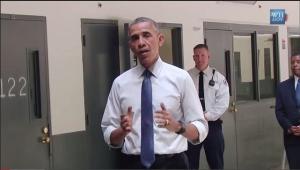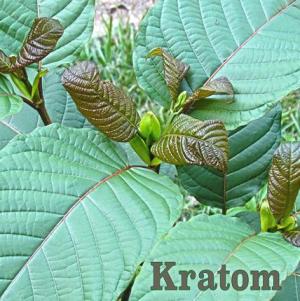Bloody drug crackdowns, a drug-related AIDS epidemic given short shrift, marijuana legalization advances, and the UNGASS. Here's the good, bad, and the ugly in global drug policy for 2016.
Ever since we began counting six years ago, the annual drug war death toll has held fairly steady. It was 49 last year.
California's legal marijuana market is the biggest in the country, but that doesn't come close to accounting for all the weed it produces.
President Obama has two more weeks to grant more clemencies to prisoners. Please write and call the White House and ask him to take a responsible but blanket approach to freeing as many drug war prisoners as he can.
Arkansas and Florida start moving toward voter-approved medical marijuana systems, Massachusetts activists push for greater patient access, and more.
A newly elected West Virginia sheriff has a meth problem, a Kentucky drug detective develops a case of sticky fingers, and more.
Maine election losers seek to block the implementation of marijuana legalization, Mexico's Sinaloa Cartel is being overtaken by an upstart, and more.
Massachusetts marijuana shops get delayed by six months, Nevada personal pot legalization goes into effect next week, the national prison population continues a slow decline, and more.
Happy New Year! Legal marijuana sales hit a new record, Maine's legalization law will go into effect on January 30 (but no shops yet), Puerto Rico sees its first dispensaries, and more.
Vermont's governor pardons nearly 200 for marijuana possession offenses, Houston's incoming DA says won't seek jail time for marijuana possession, a British medical regulatory agency recognizes CBD as medicine, and more.
It's going to cost big bucks to get into the Arkansas medical marijuana growing business, a petition urging Donald Trump not to let the DEA ban kratom seeks signatures, there is asset forfeiture action in three states, and more.
(See our Top Ten Domestic Drug Policy Stories of 2016 feature story too.)
The year that just ended has seen a serious outbreak of bloody violence against drug users and sellers in one country, it has seen drug offenders hung by the hundreds in another, it has seen efforts to fight the spread of drug-related HIV/AIDS falter for lack of funding, and it has seen the tenacity of the prohibitionist apparatus in the halls of the United Nations.
But there was also good news emanating from various corners of the world, including advances in marijuana legalization in Canada, the US, and Europe and the flouting of the proscription against the coca trade in the UN anti-drug treaties. And speaking of treaties, alhough we didn't include it this year because the drug policy implications remain unclear, the fruition of years'-long peace negotiations between Colombia and the leftist rebels of the FARC, which brings an end to the Western hemisphere's longest-running guerrilla war, is certainly worth noting.
Here are the ten most notable international drug policy events of 2016, the good, the bad, and the ugly:

The UN General Assembly Special Session on Drugs saw progress, but achingly little. (Wikimedia.org)
The global prohibitionist consenus was under growing strain at the UNGASS on Drugs, as civil society pressed the UN bureaucracy and member states for reforms as never before. But changes come at a glacial pace at the level of global diplomacy, and the vision of the UNGASS as a platform for discussing fundamental issues and plotting a new course ran up against the resistance of drug war hard-liners like Russia and China, and the studied indifference of European governments, who preferred that the UN drug policy center of gravity remain at the Commission on Narcotic Drugs in Vienna. And while the US delegation advocated for some good stances, it, too, opposed any meddling with the trio of UN conventions that form the legal backbone of global drug prohibition.
Still, there were some incremental victories. UN agencies submitted their own position papers, many highly progressive, as were the submissions from some countries and international organizations. EU states and others fought hard for language opposing the death penalty for drug offenses, though unsuccessfully. And while the UNGASS Outcome Document avoids most big issues, it puts strong emphasis on treatment and alternatives to incarceration. It acknowledges the importance of human rights and proportionate sentencing. It has support for naloxone (the overdose antidote), medication-assisted treatment (e.g. methadone and buprenorphine), and safe injecting equipment, though avoiding the term "harm reduction" itself. And it calls for addressing obstacles to opioid availability. (Read a detailed report on UNGASS by some of our colleagues here, and read about some of our own work for the UNGASS here.)
2. Global Harm Reduction for AIDS Remains Tragically Underfunded, and Facing Worse. Despite the repeatedly-proven positive impact of harm reduction measures in reducing the spread and prevalence of HIV/AIDS, donors continue to refuse to pony up to pay for such measures. The UNAIDS program estimates that $2.3 billion was needed to fund AIDS-related harm reduction programs last year, but only $160 million was actually invested by donors as most member states cut their aid levels. That's only 7% of the requested funding level. That's after 2015 saw the first drop in support in five years (see pages 21-22) in funding for AIDS efforts in low- and middle-income countries. The world spends an estimated $100 billion a year on fighting drugs, but it can't come up with 2.3% of that figure to fight drug-related AIDS harms. Harm Reduction International has proposed a "10x20" shift of 10% of law enforcement funding toward harm reduction services by 2020 to address the gap.
Harm reduction's global funding challenges are further impacted by the global AIDS-fighting budget, which has taken a hit as the rise in the dollar has reduced the spending power of contributions from donor countries that use other currencies. Even worse, many of the countries currently benefiting from UN harm reduction funding have progressed economically to a point at which they are supposed to begin funding their own programs according to the UN development framework. But that may not be a realistic expectation, especially for the sometimes politically fraught programs needed to address disease transmission related to drug use.
3. America's Most Populous State Legalizes Marijuana, and So Do Several More. You know the global prohibitionist consensus is crumbling when the rot sets in at home, and that's what happened in November's US elections. California, Nevada, Maine, and Massachusetts all voted to legalize marijuana, joining Alaska, Colorado, Oregon, and Washington, which had led the way in 2012 and 2014. Now, some 50 million Americans live in pot-legal states, and that's going to mean increasing pressure on the government in Washington to end federal pot prohibition. It's also an example to the rest of the world.
4. Europe's Prohibitionist Consensus Begins Crumbling Around the Edges. No European nation has legalized marijuana, but signs are increasing that somebody is going to do it soon. If 2016 was any indication, the best candidates may be Italy, where a broadly supported legalization bill got a parliamentary hearing this year before surprise election results upset the country's political apple cart; Germany, where "legalization is in the air" as Berlin moves toward allowing cannabis coffee shops and Dusseldorf moves toward total marijuana legalization; and Denmark, where Copenhagen is trying yet again to legalize weed. In both Denmark and Germany, legalization isn't currently favored by the central governments, while in Italy, everything is in limbo after Europe's populist uprising swept the prime minister out of office. Still, the pressure is mounting in Europe.

Amsterdam's famed cannabis coffee houses look set to final get a legal source of supply. (Wikimedia.org)
6. Canada's Move Toward Marijuana Legalization Continues Apace. Justin Trudeau and the Liberals swept the Tories out of power in October 2015 with a platform that included a clear-cut call for marijuana legalization. Movement toward that goal has been slow but steady, with the task force charged with clearing the way calling for wide-ranging legalization in a report report issued in December. The Liberals say they expect to file legalization bills in the parliament this spring, and Canada remains on track to free the weed.
7. Bolivia Ignores UN Drug Treaty, Agrees to Export Coca to Ecuador. Bolivian President Evo Morales, a former coca grower union leader himself, opened the year campaigning to decriminalize the coca trade and closed it without waiting for the UN to act by inking an agreement with Ecuador to export coca there. The agreement would appear to violate the UN Single Convention on Narcotic Drugs, which bans the export of coca leaf because it contains the cocaine alkaloid, but neither Bolivia nor Ecuador seem to care.

Mexico's latest drug war marked its 10th anniversary last month. (Wikimedia.org)
There are signs of hope on the policy front though, if early ones, with medical marijuana being implemented, attitudes toward legalization softening, and the government playing a role in forwarding the international debate on drug policy reform.
9. Iran Has Second Thoughts About the Death Penalty for Drugs. The Islamic Republic is perhaps the world's leading drug executioner, with drug offenders accounting for the vast majority of the more than a thousand people it executed in 2015 (2016 numbers aren't in yet), but there are increasing signs the regime could change course. In November, the parliament agreed to expedite deliberations on a measure that would dramatically limit the number of people facing execution for drugs. Now, the proposal will get top priority in the Legal and Social Affairs Committee before heading before the full parliament. The measure would limit the death penalty to "organized drug lords," "armed trafficking," "repeat offenders," and "bulk drug distributors."
10. The Philippines Wages a Bloody War on Drug Users and Sellers. With the election of former Davao City Mayor Rodrigo Duterte as president, the country descended into a veritable blood-bath, as police and "vigilantes" seemingly competed to see who could kill more people faster. Duterte has brushed off criticism from the US, the UN, and human rights groups, and even insulted his critics, although he did have kind words to say about Donald Trump, who had kind words to say about him. As of year's end, the death toll was around 6,000, with the vigilantes claiming a slight lead over the cops.
back to top
With 2016 now behind us, it's time for some year-end accounting, and when it comes to fatalities related to drug law enforcement, that accounting means tallying up the bodies. The good news is that drug war deaths are down slightly from last year; the bad news is that people are still being killed at the rate of about once a week, as has been the norm in recent years. There were 49 people killed in the drug war last year.
This is the sixth year that Drug War Chronicle has tallied drug war deaths. There were 54 in 2011, 63 in 2012, 41 in 2013, 39 in 2014, and 56 in 2015, That's an average of just a hair under one a week during the past six years.The Chronicle's tally only include deaths directly related to US domestic drug law enforcement operations -- full-fledged, door-busting, pre-dawn SWAT raids, to traffic stops turned drug busts, to police buy-bust operations. Some of the deaths are by misadventure, not gunshot, including several people who died after ingesting drugs in a bid to avoid getting busted and two law enforcement officers who separately dropped dead while.
Many of those killed either brandished a weapon or actually shot at police officers, demonstrating once again that attempting to enforce drug prohibition in a society rife with weapons is a recipe for trouble. Some of those were homeowners wielding weapons against middle-of-the-night intruders who they may or may not have known were police.
But numerous others were killed in their vehicles by police who claimed suspects were trying to run them down and feared for their lives when they opened fire. Could those people have been merely trying to flee from the cops? Or were they really ready to kill police to go to avoid going to jail on a drug charge?
Which is not to understate the dangers to police enforcing the drug laws. The drug war took the lives of four police officers last year, one in a shootout with a suspect, one in an undercover drug buy gone bad, one while doing a drug interdiction training exercise at a bus station, and one while engaged in a nighttime drug raid over a single syringe. That's about par for the course; over the six years the Chronicle has been keeping count about one cop gets killed for every 10 dead civilians.
Here are December's drug war deaths:
On December 7, in Dallas, Texas, Keelan Charles Murray, 37, shot and killed himself as local police operating as part of a DEA drug task force attempted to arrest him for receiving a package of synthetic opioids. Police said they were clearing the apartment when they heard a gunshot from upstairs. A Duncanville police officer then shot Murray in the shoulder, and Murray then turned his own gun on himself. Murray was locally notorious for having sold heroin to former Dallas Cowboy football player Matt Tuinei, who overdosed on it and died in 199. Dallas Police are investigating.
On December 11, in White Hall, West Virginia, Marion County police attempting to serve a drug arrest warrant shot and killed Randy Lee Cumberledge, 39, in the parking lot of the local Walmart. Police said they spotted Cumberledge's vehicle, but when they approached and ordered him to show his hands, he put his vehicle into gear and "drove aggressively" toward a deputy. Both the deputy and a White Hall police officer opened fire, killing Cumberland. There was no mention of any firearms recovered. The West Virginia State Police are investigating.
On December 12, in Byron, Georgia, member of a Peach County Drug Task Force SWAT team shot and killed Rainer Smith, 31, when he allegedly opened fire on them with a shotgun as they forced their way into his home to arrest him. Smith wounded two Byron police officers before return fire from police killed him. Police said no one answered the door when they arrived, so they forced their way in, and were immediately met by gunfire. Smith's live-in girlfriend and infant daughter were in the home with him. They were uninjured. The Georgia Bureau of Investigation is investigating.
On December 21, in Knox, Indiana, Knox Police shot and killed William Newman, 46, as they attempted to arrest him for possession of methamphetamine, failure to appear for dealing meth, and violating parole. Police said Knox attempted to flee, almost running down an officer, and they opened fire. He died in a local hospital hours later. The Indiana State Police are investigating.
back to top
This article was produced in collaboration with AlterNet and first appeared here.
California's agricultural bounty is fabled, from the endless olive and almond groves of the Central Valley to the world-class grapes of the Napa Valley to the winter vegetables of the Imperial Valley to the garlic fields of Gilroy, and beyond. But the biggest item in California's agricultural cornucopia is cannabis.
According to report last week from the Orange County Register, California's marijuana crop is not only the most valuable agricultural product in the nation's number one agricultural producer state, it totally blows away the competition.
Using cash farm receipt data from the state Department of Food and Agriculture for ag crops and its own estimate of in-state pot production (see discussion below), the Register pegs the value of California's marijuana crop at more than the top five leading agricultural commodities combined.
Here's how it breaks down, in billions of dollars:
- Marijuana -- $23.3
- Milk -- $6.28
- Almonds -- $5.33
- Grapes -- $4.95
- Cattle, calves -- $3.39
- Lettuce -- $2.25
That estimate of $23.3 billion for the pot crop is humongous, and it's nearly three times what the industry investors the Arcview Group estimated the size of the state's legal market would be in the near post-legalization era. So, how did the Register come up with it, and what could explain it?
The newspaper extrapolated from seizures of pot plants, which have averaged more than two million a year in the state for the past five years, and, citing the UN Office on Drugs and Crime, used the common heuristic that seizures account for only 10% to 20% of drugs produced. That led it to an estimate of 13.2 million plants grown in the state in 2015 (with 2.6 million destroyed), based on the high-end 20% figure.
It then assumed that each plant would produce one pound of pot at a market price of $1,765 a pound. Outdoor plans can produce much more than a pound, but indoor plants may only produce a few ounces, so the one-pound average figure is safely conservative.
The $1,765 per pound farm gate price is probably optimistic, though, especially for outdoor grown marijuana, which fetches a lower price than indoor, and especially for large producers moving multi-dozen or hundred pound loads.

They grow pot plants by the millions in the Golden State. (Twitter)
And it would still exceed the estimate of what the state's legal marijuana market would look like -- in 2020. Arcview estimated revenues of $6.5 billion by then under legalization. For 2015, the year the Register is looking at, Arcview pegged the state's legal (medical) market at $2.8 billion.
Even making conservative assumptions about the value of the pot crop, it's clear that California pot producers are growing billions of dollars' worth of marijuana that is not accounted for by the state's legal market. Where does it all go? Ask any of those state troopers perched like vultures along the interstate highways heading back east.
That's a phenomenon that's not going to stop when California's legal marijuana market goes into full effect. It's not going to stop until people in states like Illinois and Florida and New York can grow their own. In the meantime, California pot growers are willing to take the risk if it brings the green.
back to top

President Obama's historic visit to a federal prison, July 2015
In April 2014, the Obama administration issued an
historic call for clemency petitions. Since that time, Pres. Obama has released more than 1,200 people under this program, most of them nonviolent prisoners who've served ten years or more for low-level offenses
The next few weeks are Obama's last chance to show such mercy to more people. A range of organization and individuals, including mayors, foundation executives and philanthropists, formerly incarcerated including past clemency recipients and others, have urged the president to take a broader approach that will help more people. Advocates have also noted the program to date has largely left out prisoners convicted of marijuana offenses, and that it has failed to proportionately help female prisoners, many of whom were charged for the drug trafficking offenses of their partners under conspiracy laws.
Please use our form to urge Pres. Obama to grant as many more appropriate clemencies as he can. When you're done, please use this call tool from Weekly Actions to Resist Trump to call the White House too. Lastly, please use the comment board on this web page to post any petitions or other efforts you know about that advocate on individual clemency appeals or in support of the general clemency effort.
Suggestions for the president include:
- issuing blanket commutations for crack cocaine prisoners still serving the longer sentences Congress repealed in 2010;
- giving special priority to veterans, elderly prisoners, and prisoners sentenced to double mandatory minimum sentences for drug offenses;
- granting relief to prisoners who have multiple convictions but whose sentences were triggered only by drug offenses;
- granting blanket relief to any drug war prisoners serving a more than 20-year sentence, possibly excepting only the highest-level kingpins, as well blanket relief to prisoners with much shorter sentences who have just one or two convictions;
- reconsider clemency petitions from marijuana prisoners and women who may have been convicted under conspiracy laws; and
- use existing categorizations about prisoners' risk of re-offending, based on prison officials' determinations as well as age and past offenses, as an expedited vetting process to be able to get these done before January 20th.
This is a brief moment in time when it is possible to change the lives of drug war victims in the most dramatic way possible. Your emails and phone calls to Pres. Obama could make all the difference for any number of people. Thank you for taking a stand for justice.
back to top
Arkansas and Florida start moving toward voter-approved medical marijuana systems, Massachusetts activists push for greater patient access, and more.
Arkansas
Last Friday, a lawmaker filed medical marijuana implementation bills. State Rep. Douglas House (R-North Little Rock) has filed a pair of bills aimed at the state's new medical marijuana law. House Bill 1057 would add national and state criminal background check requirements, while House Bill 1058 would amend the definition of written certification to clarify that it is not a medical record. The bills are not yet available on the legislative web site.
Florida
As of Tuesday, Florida is now a medical marijuana state. The constitutional amendment approved by voters in November to legalize medical marijuana went into effect Tuesday. But the state doesn't have a distribution system up and running yet. Lawmakers and the state Department of Health will have to craft rules, with an implementation target date of September 9.
Massachusetts
On Tuesday, a public hearing heard calls for eased patient access. At a public hearing in Boston Tuesday, advocates called for changes in the state's medical marijuana law to allow hospices and nursing homes to provide the medicine for patients. "Hospice patients are literally out of time," said Elizabeth Dost, clinical director for the Massachusetts Patient Advocacy Alliance, which represents medical marijuana patients. "The patient's average length of stay (in hospice) in Massachusetts is 35 to 45 days. By the time they access cannabis, they are often deceased." Another public hearing is set for Thursday morning in Holyoke.
New Hampshire
Last Friday, a new bill being drafted would let patients grow their own. A bill currently in draft form would allow patients living at least 30 miles from a dispensary to grow their medicine. New Hampshire and Connecticut are the only New England states that don't allow patients to grow, and state Rep. Renny Cushing (D-Hampton) wants to change that. He said he is open to altering the bill's language, including the 30-mile provision.
Puerto Rico
Last Friday, the territory got its first dispensaries. Medical marijuana dispensaries have begun operating in the US territory, Gov. Alejandro Garcia Padilla said Friday. He said two dispensaries are now open. The move comes nearly two years after his administration adopted a regulation to allow for medical marijuana.
[For extensive information about the medical marijuana debate, presented in a neutral format, visit MedicalMarijuana.ProCon.org.]
back to top
A newly elected West Virginia sheriff has a meth problem, a Kentucky drug detective develops a case of sticky fingers, and more. Let's get to it:
In Spencer, West Virginia, the newly elected Roane County sheriff was arrested Tuesday on charges he stole methamphetamine from the evidence room of his previous employer, the Spencer Police Department. Sheriff Bo Williams faces removal from office after being charged with grand larceny. He had been placed on leave and resigned from the Spencer Police in December after investigators found evidence bags in his car and home. Williams has admitted to the theft and said he had been strung out for more than a year.In Louisville, Kentucky, a former Louisville Metro Police detective pleaded guilty December 22 to stealing cash from UPS packages he was inspecting as part of the Narcotics Airport Interdiction Team. Kyle Willet, 48, "would identify UPS packages that possibly contained cash. He would then take the packages to his vehicle and open them. On a number of occasions, he then stole the contents of (the) packages." Federal prosecutors said he got away with nearly $75,000 in cash. Willet's attorney said that he was sorry, "but I think it's important for everyone to know that's whose money it was. It's cartel drug dealer money." Willet copped to one count of theft from interstate commerce and is looking at up to 10 years in federal prison when sentenced in April.
In Philadelphia, a former Bucks County jail guard was sentenced last Wednesday to between six and 23 months in prison for trying to smuggle suboxone into the Bucks County Correctional Facility in return for a $500 bribe. John Christopher Dingle, 36, copped to one count of possession with intent to deliver a controlled substance. Dingle said he was trying to help a prisoner who had helped him maintain order, but the prisoner's girlfriend was secretly working with the cops, and he was arrested after accepting suboxone strips as part of the plan.
back to top
Maine election losers seek to block the implementation of marijuana legalization, Mexico's Sinaloa Cartel is being overtaken by an upstart, and more.

With El Chapo behind bars, the Sinaloa Cartel is being overtaken by rivals.
Sore Losers Department: Maine Marijuana Foes Now Seek Moratorium on Implementing Legalization. The anti-legalization group Mainers Protecting Our Youth and Communities, whose effort to defeat the marijuana initiative failed and whose effort to overturn the results via a recount also failed, is now calling for a moratorium on implementing the law. The law calls for a nine-month period for regulators to make rules for retailers and social clubs, but the group says that isn't enough.
Heroin and Prescription Opioids
Michigan Overdose Reversal Drugs Will Be Easier to Obtain Next Week. Thanks to bills signed into law Wednesday, Michiganders will have easier access to the opioid overdose reversal drug naloxone (Narcan) beginning January 1. One bill allows pharmacists to dispense the drug without a prescription under a standing order from the state's chief medical officer. Another bill gives school boards the ability to get a prescription for naloxone to be administered by a school nurse or other trained employee in case a student overdoses.
International
DEA Says There's a New Biggest Cartel in Mexico. The days of Sinaloa Cartel dominance of the Mexican drug trade and criminal underworld are over, and "El Chapo" Guzman's men have been ousted by a relatively new player on the scene: the Jalisco New Generation Cartel (CJNG in its Spanish initials), the DEA says. The group operates in at least half of Mexico's states, as well as along the entire Pacific Coast of North and South America, as well as having distribution operations in Asia, Oceania, and Europe.
back to top
Massachusetts marijuana shops get delayed by six months, Nevada personal legalization goes into effect next week, the national prison population continues a slow decline, and more.

Hemp is on the move in America. (Vote Hemp)
Amid Protests, MA Governor Signs Law Pushing Back Legalization Implementation. Gov. Charlie Baker (R) Friday signed into law a bill delaying the opening of retail marijuana shops for six months, from January 2018 to July 2018. He did so as demonstrators gathered at the capitol to protest the measure, which was hot-rodded through the legislature by a mere handful of solons on Wednesday. The delay "not only flies in the face of the will of the voters who voted for the January 2018 deadline, it shows contempt for the legislature itself, having been passed, not after three readings to the full House and Senate, but in the course of less than an hour by just two senators and five representatives," said the Massachusetts Cannabis Reform Coalition, which organized the protest.
Nevada Legalization Goes Into Effect Next Week. Voters approved the Question 2 marijuana legalization initiative in November and will begin to enjoy the fruits of their victory on January 1, when the new law goes into effect. It will allow people 21 and over to possess up to an ounce of weed or an eighth-ounce of cannabis concentrates. But retail sales won't go into effect until the state sets up a regulatory structure. The state has until January 2018 to get it done.
Industrial Hemp
Vote Hemp Issues Year-End Report: Four More Hemp States. The industry lobbying and educational group points to hemp victories in Alabama, Florida, Pennsylvania, and Rhode Island this year, as well as hemp-related bills passing in some other states that have already approved industrial hemp production. In all, hemp bills were introduced in 29 states in 2016.
Sentencing
Nation's Prison Population Now at 13-Year Low. Driven largely by a drop in the federal prison population, the country's overall prison and jail population dropped 2% in 2015, pushing it down to levels not seen in more than a decade, the Bureau of Justice Statistics reported Thursday. The decline continues a downward trend that began in 2009. A 7% decline in federal prisoners accounting for 40% of the overall decrease, but states including California and Texas also saw significant prisoner population reductions.
Activist and Author Tony Papa Wins a Pardon. The Drug Policy Alliance's Tony Papa was granted a pardon by New York Gov. Andrew Cuomo Friday. Papa served 12 years of a 15-to-life sentence for drug trafficking before he was granted clemencyby then Gov. George Pataki (R) in 1997. Since then, he has authored two books, pursued a career as an artist, and been a devoted drug reform activist.
International
Poll: British Columbia Voters Ready to Legalize Hard Drugs to Fight Opioid Crisis. A new survey of provincial attitudes toward drugs and addiction finds that nearly two-thirds of residents are open to considering hard drug legalization in the context of the province's ongoing opioid crisis. Some 63% said they were either completely willing to consider legalization or open to considering it with more information, while only 20% flat-out rejected it. Another 17% said they were not willing now, but might change their minds with new information.
back to top
Happy New Year! Legal marijuana sales hit a new record, Maine's legalization law will go into effect on January 30 (but not pot shops), Puerto Rico sees its first dispensaries, and more.

Somebody modified the iconic Hollywood sign on New Year's Eve. (Twitter)
US Marijuana Sales Hit Nearly $6 Billion in 2016. A new report from Arcview Market Research put US legal and medical marijuana sales at $5.86 billion last year, with nearly another $900 million being sold in Canada. Assuming a compound annual growth rate of 25%, Arcview estimates that North American sales will reach $20.2 billion by 2021.
California Bill Would Specifically Outlaw Pot Smoking Behind the Wheel. State Sen. Jerry Hill (D-San Mateo) and Assemblymember Evan Low (D-Silicon Valley) have filed Senate Bill 65, which would make it a misdemeanor to drive while smoking or otherwise ingesting marijuana. Hill said he filed the bill because the state's legal marijuana law does not explicitly bar such activity.
Idaho Moms for Marijuana Founder Busted for CBD at Statehouse Rally. Serra Frank, the founder of Moms for Marijuana International, was arrested on the capitol steps in Boise Sunday for possession of marijuana after she displayed a pill bottle containing what she said were capsules containing CBD oil. She was also charged with possession of paraphernalia. The rally was held to protest Gov. "Butch" Otter's (R) veto of a CBD bill last year.
Maine Legalization Goes Into Effect January 30, But Governor Wants a Moratorium on Sales. Tea Party Republican Gov. Paul LePage has officially certified the results of the November vote on marijuana legalization, meaning it will go into effect at month's end. But he also called for a moratorium on sales until lawmakers can work out regulatory details. The state's new pot law already gives the legislature nine months to come up with regulations, leading legalization activists to describe LePage's moratorium call as "defeatist" and premature.
Medical Marijuana
Arkansas Lawmaker Files Medical Marijuana Implementation Bills. State Rep. Douglas House (R-North Little Rock) has filed a pair of bills aimed at the state's new medical marijuana law. House Bill 1057 would add national and state criminal background check requirements, while House Bill 1058 would amend the definition of written certification to clarify that it is not a medical record. The bills are not yet available on the legislative website.
New Hampshire Bill Would Let Patients Grow Their Own. A bill currently in draft form would allow patients living at least 30 miles from a dispensary to grow their medicine. New Hampshire and Connecticut are the only New England states that don't allow patients to grow, and state Rep. Renny Cushing (D-Hampton) wants to change that. He said he is open to altering the bill's language, including the 30-mile provision.
Puerto Rico Gets First Dispensaries. Medical marijuana dispensaries have begun operating in the US territory, Gov. Alejandro Garcia Padilla said Friday. He said two dispensaries are now open. The move comes nearly two years after his administration adopted a regulation to allow for medical marijuana.
back to top
Vermont's governor pardons nearly 200 for pot, Houston's incoming DA says no jail for pot possession, a British medical regulatory agency recognizes CBD as medicine, and more.

British medical authorities have officially recognized CBD cannabis oil as a medicinal product. (Creative Commons/Wikimedia)
Alaska Gets First Legal Marijuana Tax Revenues. The state is starting to reap the fiscal benefits of marijuana legalization, as the Department of Revenue announced it had taken in $81,000 in taxes from seven growers in the month of November. The revenues came from taxes on 98 pounds of pot and 10 pounds of trim, which are taxed at $50 an ounce and $15 an ounce, respectively.
Vermont Governor Pardons 192 for Pot Possession. Gov. Peter Shumlin (D) has pardoned 192 people convicted of possessing small amounts of marijuana. Some 450 people applied for pardons after Shumlin announced the program last month, but he only pardoned 192 after looking at subsequent criminal histories. "While attitudes and laws about marijuana use are rapidly changing, there is still a harmful stigma associated with it," Shumlin said. "My hope was to help as many individuals as I could overcome that stigma and the very real struggles that too often go along with it."
No Jail for Marijuana Possession in Houston. Incoming Harris County District Attorney Kim Ogg has said the practice of jailing people for pot possession is over. "All misdemeanor possession of marijuana cases will be diverted around jail," Ogg said. "I've never felt good about putting marijuana users in the same jail cells as murderers. It's just not fair, it doesn't make any sense, and our country is resoundingly against that."
Medical Marijuana
Florida is Now a Medical Marijuana State. The constitutional amendment approved by voters in November to legalize medical marijuana went into effect Tuesday. But the state doesn't have a distribution system up and running yet. Lawmakers and the state Department of Health will have to craft rules, with an implementation target date of September 9.
Massachusetts Medical Marijuana Hearing Aims to Ease Patient Access. At a public hearing in Boston Tuesday, advocates called for changes in the state's medical marijuana law to allow hospices and nursing homes to provide the medicine for patients. "Hospice patients are literally out of time," said Elizabeth Dost, clinical director for the Massachusetts Patient Advocacy Alliance, which represents medical marijuana patients. "The patient's average length of stay (in hospice) in Massachusetts is 35 to 45 days. By the time they access cannabis, they are often deceased." Another public hearing is set for Thursday morning in Holyoke.
Law Enforcement
NAACP Activists Arrested in Protest at Attorney General Nominee's Office. Six NAACP demonstrators were arrested after occupying the Mobile, Alabama, offices of Sen. Jeff Sessions (R-AL), Donald Trump's choice to head the Justice Department. The NAACP is demanding the Sessions turn down the nomination to be attorney general, citing his record of ignoring voter suppression but prosecuting black voting rights activists. Sessions is also opposed by broad swathes of the drug reform community for his stances against marijuana legalization and sentencing reform and in favor of asset forfeiture.
International
Britain Recognizes CBD as a Medicine. The Medicines and Health Care Products Regulatory Agency (MHRA) Tuesday classified CBD as a medicine in the United Kingdom. The agency said it made the move after reviewing claims from several companies that their CBD products offered health benefits.
Georgia Marijuana Activists Face 12 Years in Prison for Planting Pot Seeds. In a New Year's Eve act of civil disobedience, dozens of activists and the Girchi Party planted pot seeds at party offices, publicly breaching the country's criminal code and exposing themselves to up to 12 years in prison under the country's drug laws. The Girchi Party is demanding drug decriminalization and marijuana legalization.
back to top
It's going to cost big bucks to get into the Arkansas medical marijuana growing business, a petition urging Donald Trump not to let the DEA ban kratom seeks signatures, there is asset forfeiture action in three states, and more.

The American Kratom Association is petitioning Donald Trump to block any ban on the herb. (Project CBD)
Arkansas Sets Grower License Fee at $100,000. People who want one of the five commercial medical marijuana cultivation licenses the state is preparing to issue better have deep pockets. The Medical Marijuana Commission has set an annual fee of $100,000 for those licenses. But wait, there's more: That's in addition to a $15,000 application fee, only half of which will be refunded if the application is rejected. And applicants must show proof they have a million dollars in assets or surety bond and $500,000 in cash. One commission member argued for a lower, $15,000 license fee, saying he didn't want some residents to be shut out of the opportunity, but that move didn't fly.
Kratom
Less Than Three Weeks Remain to Sign Trump Kratom Petition. The American Kratom Association has organized a petition urging President-elect Donald Trump to halt the DEA's effort to criminalize kratom or to reverse any last-minute ban that might occur under the Obama administration. The group has set a target of 25,000 signatures before January 22, but only has 8,000 so far.
Heroin and Prescription Opioids
Ohio Governor Signs Naloxone Expansion Bill. Gov. John Kasich (R) has signed into law Senate Bill 319, which expands access to the anti-overdose drug naloxone to entities such as homeless shelters, halfway houses, schools, and treatment centers that deal with populations at higher risk of overdose. It also offers civil immunity to law enforcement officers who carry and use naloxone.
Asset Forfeiture
Kansas Bill Would Undo Police Asset Forfeiture Reporting Requirements. The first bill introduced in the 2017 legislative session, Senate Bill 1, would repeal a state law requiring law enforcement agencies to file annual reports on the money and other assets they seize. The bill is the creation of the Legislative Committee on Post Audit, which filed a report last summer noting that few police agencies comply with the reporting requirements, so the committee's solution was to kill the requirement. The bill is not yet available on the legislative website. The session starts next week.
Michigan Bill Would Reform Civil Asset Forfeiture. State Rep. Peter Lucido (R-Macomb County) has introduced House Bill 4629, which would reform the state's forfeiture laws by killing a provision that requires property owners whose property is seized to pay 10% of what police feel it is worth within 20 days to get the property back. Lucido said that the next step is getting rid of civil asset forfeiture. The bill is not yet available on the legislative website.
Ohio Governor Signs Civil Asset Forfeiture Reform Bill. Gov. John Kasich (R) has signed into House Bill 347, which limits civil asset forfeiture proceedings to cases involving at least $15,000 in cash and requires a criminal conviction or at least a criminal charge be filed in most cases before forfeiture proceedings can begin.
back to top













